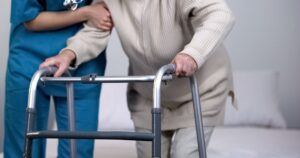When it comes to your health, Home Care Assistance Care Workers are trained in the Balanced Care Method™, where they are trained in the importance of nutrition, exercise, social ties, mental and spiritual health, and how all these things can contribute to longevity and well-being for seniors and individuals of all ages. Home Care Assistance Care Workers are also trained in knowing what foods are the most beneficial, depending on your loved one’s health, habits and goals. By working with specific lifestyle behaviours, Home Care Assistance Care Workers extend and enhance the lives of seniors, helping them live longer, happier, more balanced lives.
The beginning of another year often brings with it some reflection, resetting and resolutions for betterment, especially when it comes to our diet. With the emphasis usually falling on our waistlines, the most important part of our bodies often gets overlooked – our brain! Let’s face it, without a healthy, functioning brain, the body and mind will slowly start to deteriorate over time, which is why it is so vitally important to follow a brain-healthy diet.
What we eat can improve the health of our brains when we choose foods that help fight free-radical damage and inflammation in the brain, which is why antioxidant rich foods such as fruit, especially berries, fatty fish and vegetables, including leafy greens, are the perfect enemy to free radical damage. A well-balanced, brain fuelled diet is an important part of staying healthy as you age. It helps maintain a healthy weight, stay energised, and ensures you are getting the nutrients your body needs. It can also lower your risk of developing chronic health issues, such as heart disease, high blood pressure, high cholesterol and diabetes.
We have been supporting brain healthy eating for years through our proprietary Balanced Care Method™. Developed by Home Care Assistance, the Balanced Care Method™ is a revolutionary, evidence-based program, which demonstrates that only one-third of our longevity is based on genetics and two-thirds on lifestyle factors within our control. There is no single explanation for how and why some people live longer and have more active years than others – some already deep into their 90s and even at 100s, but there is a place where more people live longer and healthier than any other place on earth: Okinawa, Japan. Scientists have been studying this group of seniors to see if we could learn from their methods and live longer, more productive lives ourselves.
Researchers have found that those who closely followed a Mediterranean-like diet were less likely to lose brain volume as they aged, and it served as a protective factor against memory decline. Swapping out your usual cereals or toast for whole grain options with seeds and nuts is a simple step in the right direction.
Here are three key tips to setting up your brain-healthy eating habits: Make it easy, make it tasty and make it together.
- Make it easy – A little preparation will help get you off on the right track and Home Care Assistance in-home care services can help. Try and have two or three healthy foods that are easy to eat and available such as ready cut carrot sticks, or a great nut and seed combo for snacking on. A baking afternoon on a weekend could help you have some pre-prepared healthy meals to simply reheat during the week, or some whole grain baked goods to snack on.
- Make it tasty – Food is fabulous and is supposed to taste delicious. Consider limiting salt and experiment with new recipes and jazz up what might seem like average staples with lots of fresh herbs and spices instead to ensure that foods that are good for you will also appeal to your taste buds. Too much sodium (salt) can lead to high blood pressure, heart disease, and stroke.
- Make it together – Healthy brain eating isn’t all about food. It is also about community and relationships. Preparing meals together with family, or anyone providing care in the home, can help keep everyone accountable and help find new ideas to incorporate more fruit and veggies into your diet. Eating together also improves relationships and will stimulate cognition through conversation.
Home Care Assistance in-home Care Workers provide support with nutrition, meal planning and cooking. They understand the importance of a balanced and nutrition rich diet for seniors ageing in place, while also providing peace of mind for the family, knowing that their loved one is eating well and being cared for.
If you think that eating for brain health will require quite a change, remember that every step in the right direction is beneficial and worthwhile. Adjusting our eating and creating new and improved habits can take time, so be patient and kind to yourself.
Eating well for your brain is a long-term investment, but it will help support cognitive vitality, and have you feeling and functioning at your best for now and well into the future.
A meaningful life as we age in place can be attained through engagement with the things we love and that are familiar to us. Support of an in-home care agency like Home Care Assistance, can bring enormous benefit and comfort to your quality of life while living independently at home. Home Care Assistance has viable solutions when it comes to supporting independent living.
For more information, get in touch with a Home Care Assistance near me today.
As a leading age care provider, Home Care Assistance offers tailored in-home care services for older Australians, enabling them to live happier and healthier lives in the comfort of their own homes.
We offer private and government subsidised Care Packages and have office locations that are a registered NDIS provider. Our Care Workers undergo extensive training in order to deliver unmatched in-home aged care services where people can continue ageing in place. We are proud ambassadors of the My Aged Care government funded aged care program, enabling Australians to successfully navigate the process and gain approval for in-home care support packages. Home Care Assistance offers hourly care, specialised care, Alzheimer’s and Dementia care, hospital to home care, and 24 hour in home care.













